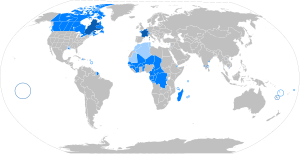Èdè Faransé
Ìrísí
(Àtúnjúwe láti Faransé)
| French | |
|---|---|
| Français | |
| Ìpè | [fʁɑ̃sɛ] |
| Sísọ ní | 29 countries |
| Agbègbè | Europe, the Americas, Africa, Asia, and Oceania |
| Ìye àwọn afisọ̀rọ̀ | about 65 million (native), more than 220 million (2007)(total) [1][2][3][4][5][6][7][8][9][10][11] |
| Èdè ìbátan | |
| Sístẹ́mù ìkọ | Latin alphabet (French variant) |
| Lílò bíi oníbiṣẹ́ | |
| Èdè oníbiṣẹ́ ní | 29 countries Numerous international organisations |
| Àkóso lọ́wọ́ | Académie française (French Academy) |
| Àwọn àmìọ̀rọ̀ èdè | |
| ISO 639-1 | fr |
| ISO 639-2 | fre (B)fra (T) |
| ISO 639-3 | fra |
 States where it is mother tongue
States where it is official language
States where it is second language
Regions where it is a minority language | |
Èdè Faransé (français, la langue française) tabi Faransé

|
Àyọkà yìí tàbí apá rẹ̀ únfẹ́ àtúnṣe sí. Ẹ le fẹ̀ jù báyìí lọ tàbí kí ẹ ṣàtúnṣe rẹ̀ lọ́nà tí yíò mu kúnrẹ́rẹ́. Ẹ ran Wikipedia lọ́wọ́ láti fẹ̀ẹ́ jù báyìí lọ. |
Awon Itokasi
[àtúnṣe | àtúnṣe àmìọ̀rọ̀]- ↑ Université de Laval. "Qu'est-ce que la Francophonie?". Archived from the original on 2011-06-23. Retrieved 2009-10-03.
- ↑ ethnologue (2000). "French". Ethnologue: Languages of the World (14th ed.). Ethnolouge. Text "FRENCH: a language of France" ignored (help)
- ↑ "Most Widely Spoken Languages in the World".
- ↑ "Top 30 Most Spoken Languages in the World by Number of Speakers".
- ↑ "Soyouwanna Know the Ten Most Widely Spoken Languages in the World?".
- ↑ "La Journée internationale de la Francophonie". Archived from the original on 2001-03-30. Retrieved 2009-10-16.
- ↑ "French Wikipedia on the List of Top Languages Spoken in the World".
- ↑ "France in Australia Embassy and Consulate-General". Archived from the original on 2011-02-17. Retrieved 2009-10-16.
- ↑ "France 24 | The latest news from around the world". Archived from the original on 2010-11-14. Retrieved 2010-11-14.
- ↑ Université Laval Archived 2011-06-23 at the Wayback Machine. (Faransé)
- ↑ "Page F30". Archived from the original on 2015-09-09. Retrieved 2009-10-16.
